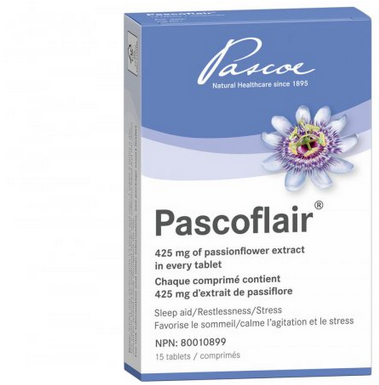I’m so thrilled today to be joining forces with Canadian supplement brand Pascoe to teach you guys all about the herbal remedy Passionflower (Passiflora Incarnata L.) – the feature ingredient of their Pascoflair product.
Passionflower has been valued historically for its potential to reduce nervousness/restlessness, induce calmness and improve sleep quality.
The goal of today’s article is to explore the research around these claims further and help you to better understand what Passionflower is, how it works and how it could contribute positively to your health.
Let’s get to the good stuff.
Passionate About Passionflower
Having written previously on the impact of flavonoids on mental health, I was excited to see that various flavonoid species are listed among the beneficial bioactive compounds found within Passionflower.
Current science suggests that these numerous flavonoid species interact with and activate the neurotransmitter GABA’s receptors in the brain which lead to the relaxation response associated with Passionflower use.
Like flavonoids found naturally occurring in food, those found within Passionflower inevitably also exert some manner of antioxidant and anti-inflammatory effects as well.
Reviewing The Human Evidence
It’s always nice when theory meets practice, so let’s explore some of the human studies that have been conducted using Passionflower.
For Sleep
A double-blind placebo controlled trial in 2011 out of Phytotherapy Research found that, compared to placebo, Passionflower use over a 1-week period improved sleep quality in a statistically significant fashion.
In 2019, The International Journal Of Clinical Pharmacology conducted a randomized controlled study on Passionflower use in adults with insomnia – noting that it improved total sleep time as compared to the placebo.
While more human research is required before firm conclusions can be drawn, we certainly have some indication from human studies that Passionflower has an effect above & beyond placebo as it relates to helping people fall and stay asleep with little to no side “hangover” side effects and no known dependency potential.
For Nervousness/Restlessness
In 2017, a study published out of Complimentary Medicine Research looked at Passionflower supplementation over a 12-week period in those with nervous restlessness.
The authors found that Passionflower use significantly improved participants quality of life scores and overall resilience ( less restless, better sleep, focus etc.).
In 2020, Nutrients conducted a systematic review of human studies looking at Passionflower use to reduce stress in potentially high stress situations (ie: before a medical procedure) and determined it was generally safe and effective for this purpose.
Safe Use Of Herbal Supplements
Passionflower is generally considered safe and well-tolerated with side effects being rare.
As with any supplement, uncertainty around personal use and safety should be addressed with a personal healthcare provider.
Passionflower is not recommended for use by those who are pregnant/breastfeeding.
Finally, it’s important to note that just about any herbal supplement has the potential to interact negatively with alcohol or medications like anticoagulants and even OTC items like Tylenol or aspirin.
Consult your healthcare provider if you are unsure if this product is right for you.
Interested in Passionflower? Check Out Pascoflair!
Pascoflair contains 425 mg of Passionflower [Passiflora incarnata] extract per tablet, the highest dose currently available on the market.
The product is available OTC alongside other sleep aids.
In partnering with Pascoe for today’s Passionflower content I’ve also been provided a voucher code – ANDY10 – which will offer you 10% off your purchases from Pascoe.ca.
I truly enjoyed looking into Passionflower in preparation for today’s piece and my hope is you found the process as insightful as I did.
I’ll be creating regular content for Pascoe featuring evidence-based insights into their product line, so stay tuned for more.
Until next time,
Andy De Santis RD MPH




